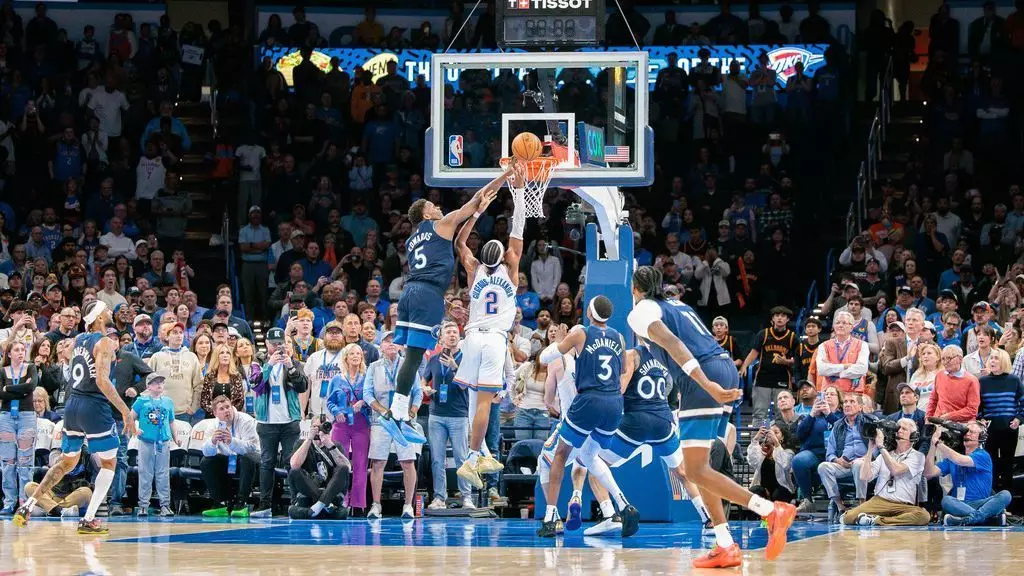In an electrifying encounter on Monday night, the Minnesota Timberwolves achieved an extraordinary victory over the Oklahoma City Thunder, winning 131-128 in overtime. This remarkable game highlighted the Timberwolves’ resilience, overcoming a daunting 16-point deficit in the final moments of regulation. Not only did this game serve as a nail-biting contest for fans, but it also underscored the tactical nuances of modern basketball.
The Timberwolves, fueled by Jaden McDaniels’ explosive 27-point performance and strong contributions from Naz Reid and Nickeil Alexander-Walker, showcased a level of teamwork and intensity that had been lacking in their previous game against the Thunder. Coming off a loss just a day before, Minnesota’s turnaround was a testament to their mental fortitude and game strategy.
Once again, Shai Gilgeous-Alexander was the focal point for the Thunder, delivering an impressive stat line of 39 points, 10 rebounds, and 8 assists. His efforts nearly propelled Oklahoma City to victory; however, it was Anthony Edwards who defined the game with a critical block on Gilgeous-Alexander’s attempt to seal the win. Edwards himself had contributed 17 points, 13 rebounds, and 8 assists, rounding off a performance indicative of his growing status as a key player in this Timberwolves lineup.
Jaden McDaniels’ all-around game, combined with Naz Reid’s double-double, ensured that Minnesota had multiple scoring options when it mattered most. Their collective offensive push in the fourth quarter not only breathed life back into the game but exemplified their determination to snatch victory from the jaws of defeat. While much of the narrative might center around flashy plays, it is the teamwork and strategic execution that drove Minnesota’s success.
Timberwolves coach Chris Finch offered insight into the nature of his team’s performance, praising their “mental toughness” while facing one of the league’s most formidable defenses. The Thunder are notorious for their aggressive style, leading to high foul counts; this created an environment where composure is key. Finch articulated the frustration of playing against such a team, noting that players like Gilgeous-Alexander are difficult to guard without committing fouls.
The Timberwolves capitalized on this, drawing a whopping 39 free throw attempts—an indication of their willingness to attack the basket and assert themselves offensively. This strategy not only kept them in the game during their comeback but ultimately set the stage for their overtime victory.
The game’s narrative was not straightforward. Oklahoma City maintained control for most of the match, leading by as much as 16 points late in the fourth quarter. Their dominance seemed unassailable; however, the resilient Timberwolves orchestrated an astonishing turnaround mainly during the final quarter where they outscored the Thunder 41-19.
Interestingly, this comeback is only the second of its kind in the play-by-play era, underscoring its historical significance. Minnesota’s persistence, even with Edwards on the bench for parts of the fourth quarter due to a calf injury, speaks volumes about their collective determination and depth—something that can be invaluable in a long season.
For the Thunder, this loss serves as a learning opportunity as they continue to lead comfortably in the Western Conference. The absence of players like Chet Holmgren due to injury demonstrates the importance of both roster depth and maintaining player health throughout the season.
The Timberwolves will look to build on this victory, rallying as they face future opponents without key players like Rudy Gobert. Their ability to bounce back from adversity and play as a cohesive unit will be critical in the coming games, especially as they aim to solidify their position within the playoff picture.
This dramatic showdown not only delighted fans but also provided valuable insights into the evolving dynamics of competitive basketball. The Timberwolves’ thrilling comeback emphasized the strength of resilience, teamwork, and strategy in overcoming challenges—a lesson that resonates beyond the court.


Leave a Reply